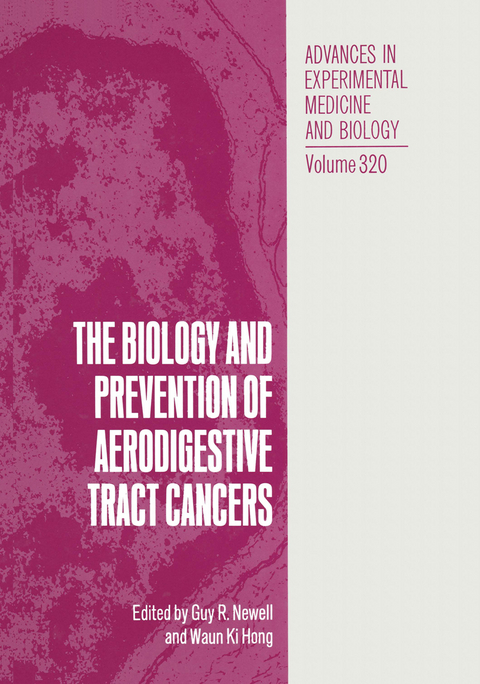
The Biology and Prevention of Aerodigestive Tract Cancers
Springer-Verlag New York Inc.
978-1-4613-6536-5 (ISBN)
The papers contained in this volume were presented ati the Golden Jubilee Cancer Prevention Conference, "The Biology and Prevention of Aerodigestive Tract Cancers," sponsored by The University of Texas M. D. Anderson Cancer Center in Houston, Texas, February 21-23, 1991. The purpose of the conference was to further the understanding of the biology, epidemiology, and prevention of aerodigestive tract cancers. Advances in under standing the biology of aerodigestive tract cancers have led to successful early chemoprevention trials. Chemopreventive agents in current use are capable 9f reversing premalignant lesions, as well as reducing the number of second primary cancers of the head and neck. These trials hold the promise that effective prevention methods for these cancers will be forthcoming in the foreseeable future. Carcinogenic exposures appear to affect the entiry epithelial lining of the upper aerodigestive tract, a phenomena described as "field cancerization. " This process contributes to the development of both synchronous and metachronous aerodigestive tract cancers. It also provides a sound rationale for the chemoprevention of these cancers. Animal models are important for identifying the critical components of field cancerization and for testing potentially new chemopreventive agents and regimens. The hamster lung carcinogen esis model and the hamster cheek model are discussed. Aerodigestive tract cancers account for about 20% of newly diagnosed invasive cancers. Cigarette smoking and alcohol consumption are the most important risk factors for these cancers.
The Etiology and Prevention of Aerodigestive Tract Cancers.- Epidemiology of Vitamin A and Aerodigestive Cancer.- Multiple Primary Squamous Carcinomas of the Upper Aerodigestive Tract.- Genetic and Environmental Interactions as Risks for Aerodigestive Cancers.- Alcohol: A Cocarcinogen in Head and Neck Malignancies.- Smokeless Tobacco and Aerodigestive Tract Cancers: Recent Research Directions.- Biologic Markers as Predictors of Risk in Aerodigestive Tract Cancers.- Hamster Lung Cancer Model of Carcinogenesis and Chemoprevention.- The Hamster Cheek Pouch Model of Carcinogenesis and Chemoprevention.- Culture Conditions Affect Expression of the ?6?4 Integrin Associated with Aggressive Behavior in Head and Neck Cancer.- Growth Factors and Other Targets for Rational Application as Intervention Agents.- Hyperplasia and Squamous Metaplasia in the Tracheobronchial Epithelium: Alterations in the Balance of Growth and Differentiation Factors.- Micronuclei as Intermediate End Points in Intervention.- Study Design for the Prevention of Aerodigestive Tract Cancers.- Participant Enrollment, Participation, and Compliance in Chemoprevention Trials.- A Population-based Trial of ?-Carotene Chemoprevention of Head and Neck Cancer.- Chemoprevention of Barrett’s Esophagus and Oral Leukoplakia.- Carotene and Retinol Efficacy Trial: Lung Cancer Chemoprevention Trial in Heavy Cigarette Smokers and Asbestos-exposed Workers.- An Intervention Trial in High-Risk Asbestos-exposed Persons.- Chemoprevention-of Aerodigestive Epithelial Cancers.- Contributors.
| Reihe/Serie | Advances in Experimental Medicine and Biology ; 320 |
|---|---|
| Zusatzinfo | X, 172 p. |
| Verlagsort | New York, NY |
| Sprache | englisch |
| Maße | 178 x 254 mm |
| Themenwelt | Medizin / Pharmazie ► Gesundheitswesen |
| Medizin / Pharmazie ► Medizinische Fachgebiete ► Onkologie | |
| Studium ► Querschnittsbereiche ► Epidemiologie / Med. Biometrie | |
| Studium ► Querschnittsbereiche ► Prävention / Gesundheitsförderung | |
| ISBN-10 | 1-4613-6536-8 / 1461365368 |
| ISBN-13 | 978-1-4613-6536-5 / 9781461365365 |
| Zustand | Neuware |
| Haben Sie eine Frage zum Produkt? |
aus dem Bereich


